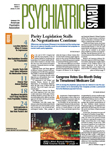Congress extended a popular children's health insurance initiative as one of its last acts of 2007.
The move to extend funding for the State Children's Health Insurance Program (SCHIP) at current levels through March 2009 was part of a bare-bones measure (S 2499) that also blocked a scheduled Medicare payment cut to physicians (see
Congress Votes Six-Month Delay in Threatened Medicare Cut).
SCHIP had operated under temporary reauthorizations, which expired December 21, 2007. The compromise measure provides enough money for states to continue to serve their current enrollment levels—about 6 million people.
The legislation was designed to be narrow and noncontroversial to secure President Bush's signature. Bush had vetoed two attempts to enact expansions of the program, which would have allowed states to serve more children in low-income families not poor enough to qualify for Medicaid.
It was on December 12, 2007, that Bush vetoed the second attempt to expand SCHIP. That bill would have expanded the program by $35 billion over five years, for a total of $60 billion, which supporters said would have covered 10 million children. It also would have limited SCHIP eligibility to families earning up to three times the federal poverty level, or about $62,000 for a family of four. But Bush—who advocated a smaller SCHIP increase—cited the price tag and argued that the proposal would“ move children who already have private health insurance to government coverage.”
Bush also opposed raising tobacco taxes to pay for the expansion, a funding strategy favored by Democrats. The bill would have raised the federal cigarette tax by 61 cents, to $1 a pack.
Bush rejected a similar measure on October 3, 2007, and the House was unable to override the veto. That bill did not cap eligibility, but it would have allowed states to serve children from families earning more than three times the poverty level if the state met certain conditions to make sure that poorer children also were being served.
Most recently, Democrats and their Senate Republican allies had been in intense negotiations with House Republicans for more than a month over SCHIP. The aim of the talks was to create a third SCHIP bill that might draw a dozen or so new House Republican votes, the margin Democrats thought they needed to override Bush's veto.
Republicans said they would not support an expansion unless it limited enrollment to children from families earning less than twice the federal poverty level—or about $41,000 for a family of four—and included strong prohibitions against enrollment of any adults or illegal immigrants in the program.
Republicans viewed the 2009 SCHIP extension as a victory because Democrats had threatened to use a shorter extension to make the fate of the popular program an issue during the 2008 campaign season. Democrats may still attempt an earlier renewal of the program, although the longer extension offers a chance to secure Republican cooperation in expanding the program to cover more uninsured children.
State officials and child advocates want any long-term extension to include extra money to help the 21 states with shortfalls in federal SCHIP funding. Such shortfalls are expected to total $1.6 billion in Fiscal 2008, according to the Congressional Research Service.
APA and other physician groups supported the expansion of SCHIP as an important means to extend health coverage to children who need mental health care, said Nicholas Meyers, director of APA's Department of Government Relations.
The text of the Medicare, Medicaid, and SCHIP Extension Act of 2007 can be accessed at<http://thomas.loc.gov> by searching on the bill number, S 2499. ▪
